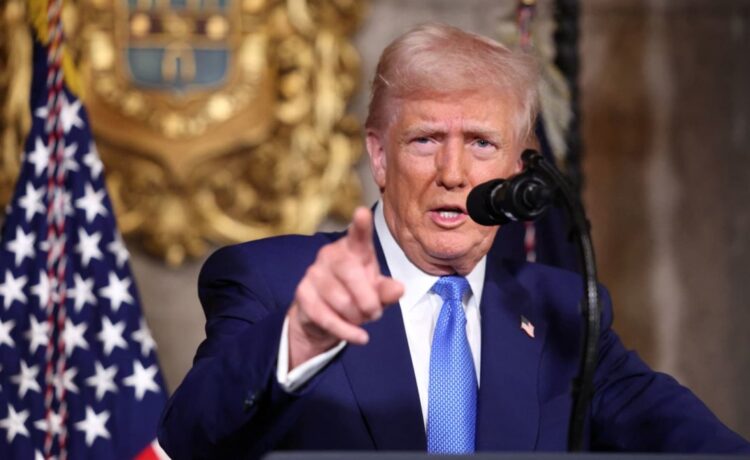This was CNBC’s live blog covering European financial markets.
Europe stocks shrug off Trump’s tariff threats
European stock markets appear to have shrugged off President Donald Trump’s tariff threat.
The pan-European Stoxx Europe 600 index closed down 1%. Regionally, the U.K.’s FTSE 100 declined by 0.2% while Germany’s DAX and France’s CAC 40 fell by 1.6%.
Read more about why investors are calling Trump’s bluff here.
— Ganesh Rao
Swiss franc rallies as investors seek shelter from volatility
Elsewhere in the market, the Swiss franc — seen, like some government bonds, as a pocket of safety in times of turbulence — is moving higher against the U.S. dollar.
The currency, which has gained around 9.2% against the greenback since the beginning of the year, was last seen trading 0.6% higher versus the U.S. currency after Trump’s EU tariffs announcement.
— Chloe Taylor
Investors flock to government bonds
Bonds across the board are still rallying in Europe, as investors dump regional stocks in a flight to safety.
Government bonds – particularly in developed economies like the U.K., U.S. and Germany – have historically been seen as a safe source of steady income, as governments are unlikely to default on their debts. Bond yields are inversely related to the asset’s price, so when demand drives prices higher, yields move lower.
Short and long-dated government debt rallied on Friday afternoon, on top of benchmark 10-year bonds{=null}.
The yield on German 2- and 5-year bunds were down by 10 basis points at 2:02 p.m. in London, as French 2-year yields also shed 9 basis points.
At the long-end of the curve, German 20- and 30-year bunds saw yields move around 7 basis points lower, while French and Italian 30-year bond yields were down 5 basis points.
— Chloe Taylor
European auto sectors in the red
European auto stocks are also a leg lower since President Donald Trump announced tariffs on the EU.
— Ganesh Rao
Banking stocks take a hit after Trump’s fresh tariffs call
European banking stocks suffered a blow during afternoon trade, after U.S. President Donald Trump’s call for 50% tariffs on the European Union.
The regional Stoxx Banks index was 3.6% lower by 1:45 p.m. in London, with Germany’s Deutsche Bank, down 5.2%, France’s Societe Generale, down 4.6%, and Italian lender Unicredit, down 4.2%.s.
Regional banks are at risk of taking an indirect hit from tariffs, via the economic impact of the duties on their clients.
— Chloe Taylor
European bond yields plummet as investors seek safety
European government bond yields extended their decline after U.S. President Donald Trump called for 50% tariffs on the European Union from June 1.
Government bonds in many developed economies are seen as safe investments in times of economic or geopolitical uncertainty. Bond yields and prices move in opposite directions, so when demand sends prices higher, yields go down.
Germany’s 10-year bund, seen as a benchmark for the euro zone, was down 8 basis points to 2.56% by 1:29 p.m. London time.
French and Italian 10-year government bond yields shed 5 basis points, while their Swiss counterparts saw yields move 12 basis points lower.
— April Roach, Chloe Taylor
European consumer cyclicals and financial stocks lead losses
Shares of European financial institutions and the consumer cyclical sector sold off after Trump recommended a 50% tariff on the European Union starting June 1.
Among the big fallers were Deutsche Bank and Societe Generale shares, down 6% and 5.5%, respectively. Luxury goods makers Swatch Group and Ray Ban maker Essilor Luxottica were also lower by around 5%.
— Ganesh Rao
Sterling touches on 1-year high
The British pound was 0.5% higher at 1:07 p.m. in London, paring earlier gains that saw it briefly touch on a 1-year high.
— Chloe Taylor
Euro pares gains after Trump tariff threat
The euro was trading 0.2% higher against the U.S. dollar by 1:11 p.m. London time, climbing down from earlier highs that saw it gain as much as 0.7% against the greenback.
— Chloe Taylor
Europe stocks fall after Trump threatens 50% tariffs against European Union
European stock markets fell after Trump threatened 50% tariffs against the European Union.
The Stoxx Europe 600 index was lower by 1.9%, while Germany’s DAX was down by 2.3%, France’s CAC 40 was in the red by 2.8%. The U.K.’s FTSE 100 was also lower by 1.3%.
— Ganesh Rao
UK households set to pay $174 less on energy bills, regulator confirms
The U.K.’s energy regulator confirmed Friday that households will on average pay £129 ($174) less on annual energy bills.
Ofgem, the government’s Office of Gas and Electricity Markets, announced a 7% drop in the energy price cap for the period covering July to September, and said a fall in wholesale prices accounts for 90% of the fall.
The reduction will see the average U.K. household pay £1,720 per year, down 28% or £660 lower than during the energy crisis at the onset of 2023. However, costs remain 10% higher than the same period last year.
“A fall in the price cap will be welcome news for consumers, and reflects a reduction in the international price of wholesale gas. However, we’re acutely aware that prices remain high, and some continue to struggle with the cost of energy,” Tim Jarvis, director general of markets at Ofgem, said.
“In the longer term, we need an energy system where prices are insulated from the volatile international gas market, and which ensures more stable prices and energy security,” Jarvis added.
— Sawdah Bhaimiya
Johnson Matthey in focus after Honeywell’s $2.4 billion catalyst unit acquisition
Shares of London-listed Johnson Matthey traded around 4% lower on Friday, one day after U.S. industrial giant Honeywell agreed to acquire the U.K. firm’s catalyst technology business for £1.8 billion ($2.4 billion).
Johnson Matthey’s stock price soared by more than 30% in the previous session as investors digested the news.
The all-cash deal values Johnson Matthey’s unit at 11 times adjusted earnings and will sit within Honeywell’s energy and sustainable technologies division once the transaction completes.
The sold unit is a supplier of catalysts, which makes industrial chemical reactions more efficient, with about 1,900 employees based in the U.K. U.S., Europe and India.
Deutsche Bank’s analyst Tristan Lamotte said the British company struck a “good price” for the sale.
“This valuation is clearly higher than general perception (~estimated £1bn, ~8.5x [adjusted earnings]) but closer to [Deutsche Bank estimate],” said Lamotte in a note to clients. “The sale should generate a strong positive reaction today and this represents delivery on our Buy case.”
— Ganesh Rao
UniCredit doubles down on BPM bid despite government ‘Golden Rules’ conditions
Italy’s second largest bank UniCredit has doubled down on its takeover bid for domestic peer Banco BPM, noting it will file a legal complaint over the use of Rome’s “Golden Power” rules in this transaction.
The Golden Power legislation enables the Italian government to intercede or set conditions on foreign and domestic corporate takeovers in key sectors, including banking. Under the regulation, Rome had in April imposed a set of requirements for UniCredit in order to press ahead with its intended $10.5 billion takeover bid of Banco BPM, which rejected the acquisition offer shortly after its issuance in November.
Earlier this week, market regulator Consob said it suspended the bid process for 30 days, following UniCredit’s objections that more clarity was required on the government’s recent deal conditions. Banco BPM criticized the pause as “abnormal.”
“This suspension is aimed at creating the necessary time to provide both UniCredit and BPM investors with clear and adequate information, enabling them to make an informed assessment of the Offer, taking into account the exercise of the “golden power” and its related prescriptions set forth in the April 18 decree of the Presidency of Council of Ministry,” UniCredit said in a Friday statement.
— Ruxandra Iordache
Sterling rallies after positive signals for UK economy
The British pound was 0.5% higher at 9:57 a.m. in London.
The move took place after the GfK U.K. consumer confidence index rose by a higher-than-anticipated 3 points in May, while April retail figures also beat expectations.
— Chloe Taylor
German economy grew by 0.4% in first quarter
German gross domestic product rose by 0.4% quarter on quarter in the three months to March, data from the country’s Federal Statistical Office showed on Friday.
The figures revised an earlier preliminary GDP print up by 0.2 percentage points, and means the first-quarter reading now marks the strongest quarterly economic growth in Germany since 2022.
Officials attributed the upward revision to stronger-than-expected growth in manufacturing output and exports.
— Chloe Taylor
UK retail sales boost ‘won’t last,’ economist predicts

Shrewsbury town center on April 29, 2025, in Shrewsbury, England.
Alex Kerr, U.K. economist at Capital Economics, warned that “the sun won’t shine on [Britain’s] retail sector forever.”
“Although for the first time since 2015, excluding the pandemic, retail sales volumes have risen for four months in a row, April’s impressive 1.2% m/m rise was largely driven by the unusually warm weather,” he said in a note sent shortly after the figures were published.
“That boost won’t last. So even though consumer confidence ticked up slightly in May, we suspect retail sales growth will slow over the coming months.”
— Chloe Taylor
European markets open higher
It’s 8:10 a.m. in London, and regional stocks are broadly trading in positive territory.
The pan-European Stoxx 600 is 0.3% higher, with most sectors seeing gains.
London’s FTSE 100, Germany’s DAX and the French CAC 40 are all up by around 0.3%.
— Chloe Taylor
U.K. retail sales rise by better-than-expected 1.2% in April

Shoppers walk past the Lindt chocolate shop at Piccadilly Circus on 2nd April 2025, in London, England.
U.K. retail sales rose by an estimated 1.2% in April on a monthly basis, data from Britain’s Office for National Statistics showed on Friday.
The print exceeded a month-on-month rise of 0.2% anticipated by analysts, according to Reuters.
The April print marked a notable recovery from the previous month, when retail sales rose by 0.1% month-on-month. The March figure was revised down from a preliminary estimate of 0.4% growth in sales volumes.
The ONS said the April growth was helped by strong food store sales — which were up 3.9% on a monthly basis – that retailers attributed to good weather throughout the month.
— Chloe Taylor
What’s been happening outside of Europe?
Overnight in Asia, stock markets have been gripped by broadly positive momentum, after the U.S. and China agreed to keep communications open following a call between top officials.
On Wall Street, stock futures were little changed as investors continued to monitor elevated U.S. Treasury yields.
— Chloe Taylor
Here’s what to expect today
Investors will be monitoring economic data out of the European region, with figures due out on U.K. consumer confidence and retail sales as well as French consumer confidence data. A final print on Germany’s economic growth will also follow.
It’s a quieter day on earnings, with British Land and AJ Bell set to update shareholders on their finances.
— Chloe Taylor
Opening calls
Good morning from London.
It’s just past 7 a.m. in the U.K. capital, and futures are pointing to broadly positive movement expected in regional stock markets at the open.
FTSE 100 futures are up 0.2%, DAX futures have gained 0.1%, and French CAC 40 futures are marginally higher.
— Chloe Taylor





